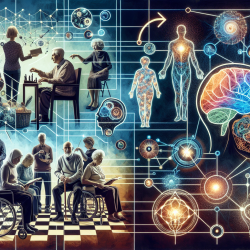Understanding Embodied Cognition in Older Adults
The concept of embodied cognition suggests that our cognitive processes are deeply intertwined with our physical actions and sensory experiences. This theory has gained traction in various fields, but its application in gerontology remains underexplored. A recent study titled "Are Older Adults Less Embodied? A Review of Age Effects through the Lens of Embodied Cognition" sheds light on how aging affects embodied cognition.
Key Findings from the Research
The study reviews age-related changes in sensory processing, mental representation, and the action-perception relationship, revealing that older adults tend to rely more on visual processing than on bodily factors. This visual dominance can lead to increased fall risks and other challenges in maintaining balance and spatial awareness.
Implications for Practitioners
For practitioners working with older adults, these findings highlight the importance of incorporating multisensory integration (MSI) training into therapy sessions. By enhancing the ability to integrate visual, tactile, and proprioceptive inputs, practitioners can help older adults maintain better balance and reduce fall risks.
Encouraging Further Research
While the study provides valuable insights, it also opens avenues for further research. Practitioners are encouraged to explore the impact of MSI training on cognitive and physical abilities in older adults. Additionally, investigating individual differences in sensory processing and their effects on cognition could lead to more personalized therapy approaches.
Conclusion
Understanding the nuances of embodied cognition in older adults is crucial for developing effective therapeutic interventions. By focusing on multisensory integration and compensating for visual dominance, practitioners can significantly improve the quality of life for older adults.
To read the original research paper, please follow this link: Are Older Adults Less Embodied? A Review of Age Effects through the Lens of Embodied Cognition.










